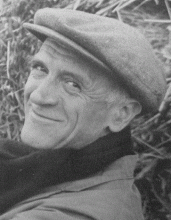John Wisdom was born 12 September 1904 in Leyton Essex. His father was a Church of England clergyman. The family settled in Bury St Edmunds in 1909 where John received his early schooling.
From 1921 Wisdom studied in Cambridge attending lectures by G. E. Moore C. D. Broad and J.M.E. McTaggart figures who (along with Ludwig Wittgenstein) became highly influential in the direction of his thought. When he graduated in 1924 he took up a job at the National Institute of Industrial Psychology in London before accepting appointment as lecturer in the Department of Logic and Metaphysics at the University of St Andrews in 1929.
Wisdom’s early thought followed in a fashion that of Russell Moore and the early Wittgenstein and his own particular method of analysis was published in his Problems of Mind and Matter (1934). That same year Wisdom took up a lectureship in Cambridge and later was made a fellow of Trinity College which brought him into closer contact with Wittgenstein. Much of the work for which he is remembered demonstrates a great deal of respect for Wittgenstein’s emphasis on ordinary language and for Moore’s common-sense approach.
Between the years 1948 and 1950 Wisdom delivered the Gifford Lectures at the University of Aberdeen under the titles of The Mystery of the Transcendental and The Discovery of the Transcendental. Theses lectures were never published. In 1952 Wisdom was appointed professor of philosophy at Cambridge and held the chair there until 1968 when he took an appointment as distinguished professor of philosophy at the University of Oregon.
Wisdom was a much loved and sociable character whose lectures were often entertaining and highly engaging. His written works are exemplary of the unique style with which he communicated his thought. He married twice with one son from his first marriage and had a life-long love of horses (often remembered for his enthusiasm for racing). He retired in 1972 returning to Cambridge where he was elected honorary fellow of Fitzwilliam College in 1978. He died in Cambridge in 1993 aged 89 years.
Some of Wisdom’s works include Interpretation and Analysis (1931) Other Minds (1952) Philosophy and PsychoAnalysis (1953) Paradox and Discovery (1965) and Proof and Explanation (the Virginia Lectures 1957) (1991).



